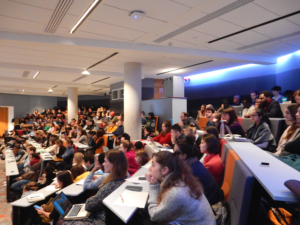Blog
How to Get a Career in International Development
Written by Simi Khan
January 24, 2019
On 16th January, LIDC and SOAS started the new year with a careers networking night. Attended by over 250 people, this event featured an interactive panel discussion and opportunities to network with early – mid-career development professionals. Our panellists were:
- Oliver Trumble, Global Partnerships Manager (Civil Society & Academia), Plan International.
- Khadija Badri, Advocacy and Engagement Officer, European Network on Statelessness.
- Amrin Nahar, Program Associate, 3ie.
- Dr Naomi Bull, Research Fellow, Royal Veterinary College.
- Barry Smith, Principal Consultant, Social Development Direct.
It was great to hear about their journeys so far, as well as their tips on how to break into international development.
DECIDING WHAT YOU WANT TO DO
Our panellists explained that, although it might seem like students need an MA or PhD to get a job in development, that is not always the case.
Here are four tips to help decide what job you want to do:
- Start with your interests and stick to it: Whether you study Economics or Science, there are lots of careers in development that link to other fields.
- Do your research: Learn about the field you’re interested in to help you explore other options.
- Start developing your transferable skills: Most organisations look for transferable skills such as communication, team work and time management when hiring. Honing these skills now can help you when applying for jobs.
- Build a network: Be open to opportunities! For example, you could volunteer, do internships, or attend networking events. This will help you to explore other aspects of development that you might not have considered.
GETTING YOUR EXPERIENCE
The majority of our panellists kick-started their careers while they were at university. Opportunities are everywhere, and here are a few tips from our experts:
- Join societies, or volunteer at an organisation: All panellists took part in extra-curricular activities, which helped them get to the next step.
- The higher education sector is a good place to start: Look for jobs within institutions to gain skills and experience.
- Using social media is an effective way to connect to people in the industry: LinkedIn, Twitter, or even Googling key words could help you pursue your desired career path.
- Be inventive!: Development is becoming increasingly demanding so try to stand out with your experience. Try writing a blog, starting a society, or creating your own project.
- Honesty is the best policy: When you apply for jobs, ensure that you are honest about your interests, skills and experiences. There are always chances to develop further.
WHAT TO AVOID
Although working in development is very rewarding, there are some things you need to watch out for. Our panellists provided useful advice on how to get a foot in the door, but also what to avoid when working in the field:
- In development, you will have plenty of opportunities to network: This is a great chance to meet new people and build your social capital. However, when networking, don’t approach a conversation by listing your requirements or skills. Listen to the other person and talk about what they’re interested in. That way, you can see if you fit what they’re looking for.
- Beware of volunteerism!: Altruism is key to development, but make sure that you’re aware of the organisation’s impact on communities. Check to see whether they’re sustainable and how it benefits the community – not yourself.
Listen to the audio recording here
Simi Khan is currently doing an internship at LIDC while studying for a BA Development Studies at SOAS, one of LIDC’s core member institutions.

